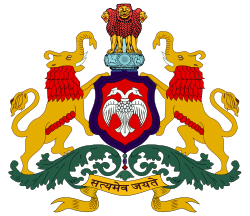 | |
| Agency overview | |
|---|---|
| Formed | 2006 |
| Jurisdiction | Government of Karnataka |
| Headquarters | Bangalore |
| Minister responsible |
|
| Website | Official website |
The Department of Higher Education is a state government department of the Government of Karnataka tasked with the governance of higher education. Its purview includes policy development, oversight of government-funded and government-aided institutions, and liaison with universities in the state.




